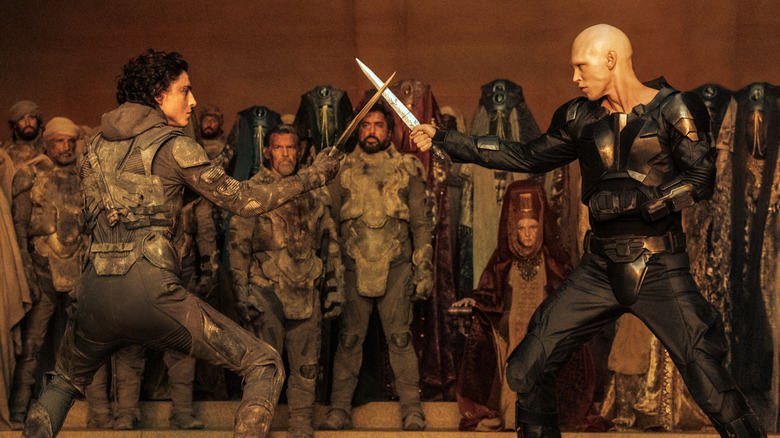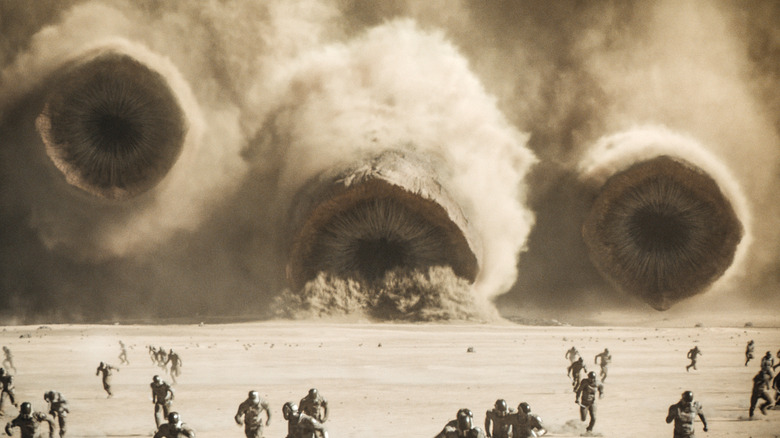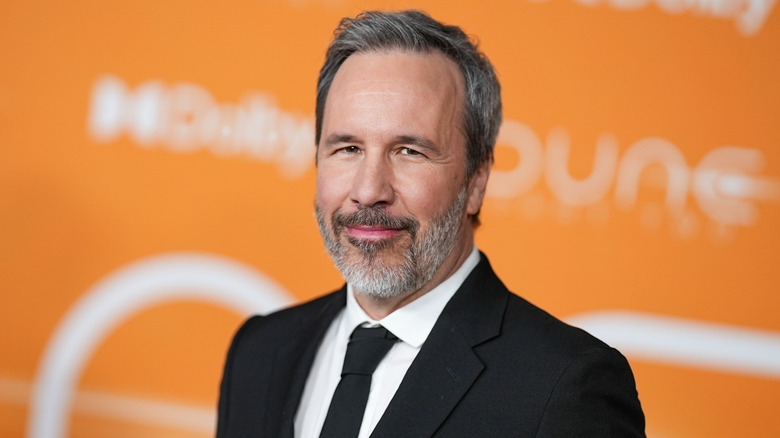This Dune 2 Scene Made People Pass Out, According To Austin Butler
Best known for playing the titular role in Baz Luhrmann's acclaimed biopic "Elvis," Austin Butler is one of several actors making their franchise debut in Denis Villeneuve's "Dune: Part Two." He stars as the devious Feyd-Rautha, a key member of the Harkonnen clan, and in an interview with Entertainment Weekly, he opened up about how production on the film wasn't for the faint of heart.
While "Dune: Part Two" wasn't Butler's first rodeo with a blockbuster, he found production to be daunting, especially in the desert heat. "It was 110 degrees and so hot," Butler said of his scenes in the desert planet of Arrakis, which were filmed in Budapest, Hungary. "I had the bald cap on, and it was between two soundstages that were just these gray boxes of 200-foot walls and sand. It became like a microwave," the actor explained, before adding that some people on set passed out due to heatstroke. "And that was just my first week."
Despite how grueling production got because of the weather conditions, Butler looked back on the experience fondly. "It really bonds the entire crew," he added. "There's something so humbling about being in such an uncomfortable environment."
Filming Dune in the desert was a challenge
One of the reasons why the first "Dune" was so successful was its mix of sound stages and real-life locations. A decent portion of both films were shot in desert environments so the films would feel lived-in and real. In a chat with The New York Times before the release of the first "Dune," director Denis Villeneuve discussed that it was important for his mental sanity to film in the desert. "You cannot do that with green screens," he said. "It's not possible. Not for me. Maybe some people can, but not me."
Filming in the desert has its fair share of challenges, as highlighted by Austin Butler. However, the actor was only brought on board for "Dune: Part Two." This wasn't the case for Timothée Chalamet, who has been with "Dune" since the beginning. While speaking with Stephen Colbert to promote the first picture, Chalamet talked about how filming would happen at specific times so the cast and crew could beat the desert heat. "[...] it would get so hot during the day that sometimes you had to shoot between 5 AM and 7 AM and 5 PM and 7 PM," he said, adding that the suits used by the characters to traverse through the desert were ironically bulky and sweaty, making filming particularly challenging.
As eager as Villeneuve was to film in the desert, he was also happy to have gotten a break between productions. "Both movies were made in very harsh conditions, and it's very physically taxing, so to have a break in between them was a blessing," the director told Entertainment Weekly.
Why the desert is so important for Denis Villeneuve
Denis Villeneuve is a perfectionist, which is why it's not surprising that the Quebec-born filmmaker was interested in authenticity every step of the way. Seeing as Arrakis is at the heart of Frank Hebert's "Dune" franchise, Villeneuve tried his darndest not to half-ass one of his favorite sci-fi novels. While the first "Dune" spends a considerable time on Arrakis, it's "Dune 2" that shows the diversity of the planet, taking viewers to the treacherous southern regions of the sand planet. Finding the right vibe for certain scenes was difficult, as no two sand dunes are alike. While speaking with Empire, Villeneuve opened up about the collaborative process between himself, cinematographer Greg Fraser, and production designer Patrice Vermette to find the right filming locations for the sequel.
"For my mise-en-scène, I'll want a particular shaped dune. But Greig Fraser, on the other hand, will need that same shape to be in a specific light," Villeneuve told the outlet. "So Patrice spent weeks and weeks casting sand dunes in the desert! We looked like madmen." For the crew of "Dune," it wasn't as easy as simple as picking a spot in the desert and shooting. And for what it's worth, Villeneuve is proud that "Dune 2" doesn't reuse locations in the desert, making each shot feel new for both the audience and characters.
Villeneuve is no doubt a visionary, a creative who is ready to take to the desert and put his cast and crew through arduous conditions purely for the sake of our entertainment. The director's philosophy largely stems from his love for the source material, which he's been obsessed with since his youth. In a chat with The Atlantic, Villeneuve candidly stated that the first "Dune" was made for himself, saying, "Everything you receive is there because I love it."


